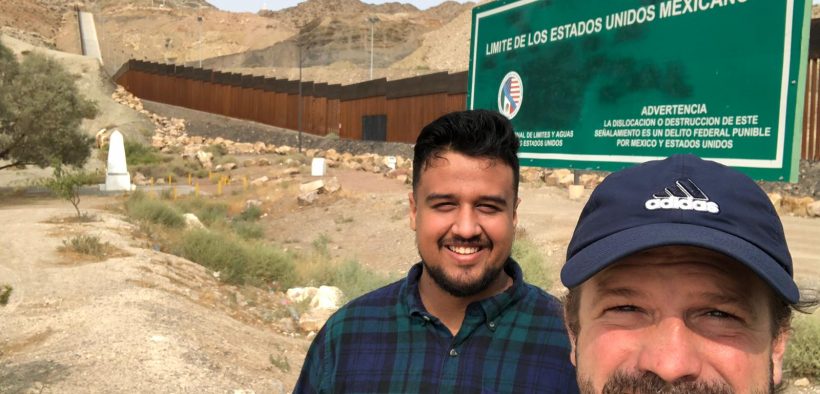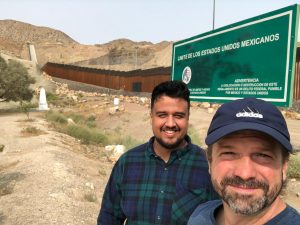Engaging at the Border
Abara, a nonprofit providing for the physical and emotional needs of more than 10,000 asylum seekers before, during, and after COVID-19, seeks to engage across cultural divides.

When Margaret* (name changed for her safety) stood at the U.S./Mexico border in summer 2019, she had been traveling for about eight weeks. Fleeing Uganda for fear of her life, she traveled by three planes and then a bus to reach Juarez, Mexico. That’s when she was told she would not cross that week or perhaps that month.

“I thought I would cross that day, but it took months and I was starting to lose hope,” said Margaret, now age 22. She said she was in search of a fresh start and safety. “I flew out of Uganda because of a situation in my country and was seeking asylum.”
The border offices referred her to a shelter, and that’s when she met the team at Abara Borderland Connections. Abara, a nonprofit with the mission of reaching across cultural divides, is very active in asylum-seeking shelters at the U.S./Mexico border, and their team quickly took Margaret under their wing. Other than providing for her physical needs, Abara’s care went deeper, Margaret said.
“They were really loyal and good to me at the time when I needed someone to talk to,” Margaret said, talking about the emotional support they extended to her. “I have never experienced so much kindness, and they were willing to show that to a stranger.”
Since its launch in spring of 2019, Abara has cared for more than 10,000 asylum seekers, some short term for a meal or a toiletry pickup and others long term, spanning months. Their main role has been to fill the gaps at more than 30 shelters on both the Juarez, Mexico and El Paso, Texas, sides of the border.
Access to MinistryWatch content is free. However, we hope you will support our work with your prayers and financial gifts. To make a donation, click here.
Abara’s Executive Director Sami DiPasquale was born and raised in the Middle East and said his experiences built into him a passion for conversations and community in bordering towns. DiPasquale lived in Cyprus, Egypt, India, and in Jordan where his parents worked at a hospital on the Syrian/Jordan border.
“In Cyprus as a teenager, I lived in Nicosia. The north was occupied by Turkey and the southern part was ethnically Greek and mostly Orthodox. The city was divided in two. There are echoes of that here in El Paso,” said DiPasquale. “As a kid, I had to cross back and forth between cultural and lingual boundaries and that spurred in me a heart and understanding of what it is like moving from different places.”
About 17 years ago, after attending Wheaton College and marrying his college sweetheart, DiPasquale worked with World Relief for three years settling refugees in the Chicago suburbs. The duo ended up in El Paso working with immigrants for 16 years.
“There is so much beauty to be present in spaces like this at an interchange of culture and languages and food and humor. And there are challenges as well,” DiPasquale said. He launched Abara out of his passion to deepen those connections, create opportunities for reconciliation across divides, education, and physically aiding those in between borders and lives.
“Abara means river ford or river crossing, and our passion is how do we cross outside these boundaries of culture and wealth and how do we try to understand those at the margins of society?” DiPasquale said.
Their team not only provides for the physical needs of asylum seekers with food and supplies for the shelters but also emotional and spiritual health. Abara facilitates, in partnership with other groups, classes led by professionals trained in English, social and mental health, offers ESL classes and opportunities to be part of micro enterprises. Abara team members train long-term shelter residents in sewing, jewelry making, and even painting, providing skills in hopes they translate into jobs upon crossing and the ability to make a money while they wait. These classes also have a therapeutic element, helping women—especially during COVID—cope with trauma. Margaret enjoyed painting classes taught by Blanca Castillo, Abara’s facilitator and shelter connector.
When Margaret crossed the border in summer 2019, she was placed in a detention center (as many asylum seekers are) until her paperwork came through. She lived there for eight long months. Abara’s care extended across the border, and Castillo and other team members visited her.
“In those moments you get the most loyal friends. I still talk to them now,” Margaret said. Margaret currently lives in Washington state with a sponsor family. She’s spent many of her days in 2020 waiting out COVID, for her work visa to process, and volunteering at a foster care facility.
“Abara is full of really good people,” she sums.
COVID created lots of opportunities for Abara to creatively adjust their nonprofit’s efforts, DiPasquale said. Immediately, their team reduced the number of staff members that crossed the border daily and went into the shelters to limit exposure. “There was a big effort to keep COVID out of the shelters because everybody was squeezed in and it spread like wildfire,” DiPasquale said.
Instead of sending team members, they would contact shelters directly to find out their needs before dropping in—which was largely to help with utilities and food, bedding and towels, DiPasquale said. Abara was able to provide AC units for many of the shelters. One shelter had terrible flooding during COVID, so Abara worked with an engineer to redesign the space.
“We collaborated closely with other groups and NGOs and opened up filter shelters,” DiPasquale said, adding that the Juarez hospitals were overrun and turning people away. “We also had people being turned away at the border and were unsure if they had COVID or not and so they would show at these filter sites.” The filter sites included COVID tests and referrals to an emergency clinic set up by asylum seekers with medical training for extreme medical needs.
The main way Abara’s work was altered negatively due to COVID was the halting of all Border Encounters. Border Encounters are a main arm of Abara, DiPasquale said, inviting Americans from all over the country to experience what is going on at the border through tours. To date, these Border Encounters have been one of the most fulfilling parts of his job, DiPasquale explained.
“We have hosted hundreds of people from around the U.S. coming with preconceived notions,” DiPasquale said. “We ask they come with an open heart and come to listen. It has been incredible the variety of people who have come to the border, and almost everybody leaves wanting to be good neighbors—to new neighbors—and trying to see how they can be part of a solution and not just yelling across this divide.”
Other positives include debunking myths surrounding asylum seeking. “A major one is informing them that asylum seeking is a legal way to come into the country,” DiPasquale said. “If you are fleeing for fear of your life, you have the opportunity to seek your case. Seeking asylum is not an illegal entry. This is a misconception.”
In addition, he said, it is a total surprise to most attendees that many of the migrant labor workers do not have a legal way to enter the country. “I have spoken to farmers from Washington state to New Mexico to Virginia and almost every farmer is using labor that has come outside the country,” DiPasquale said. “If there is an economic need and desire for a certain kind of labor or visas, then it makes sense for a legal avenue to happen. But our laws have not been significantly updated in four decades.”
DiPasquale added that Border Encounters give groups a chance to consider the humanity of the politics in our nation through face-to-face encounters with asylum seekers. “For the vast majority, they are arriving at the border without truly understanding. Even if you are frustrated by the politics, when you enter into a shelter and see 120 people, you see the person you had an image about in your head who is “forcibly entering the US,” and see she is actually a scared, frightened indigenous mom with two kids and there is fear in her eyes and hope for the future.”
The majority of his years on the border, DiPasquale observed that most individuals coming to the border were young men looking for work. But he says in the last five years the trend has changed. The bulk of asylum seekers are now young families or single moms seeking help. “When it is a 23-year-old mom with a 2-year-old and an infant, the politics and abstract ideas of what should be done and not done disappear a little bit. You are encountering a human being in the image of God and you are faced with a choice—do I engage?”
While DiPasquale said he knows the work he is doing is just a drop in the bucket of a very large, layered problem, he is passionate to play his role. “There is a humanitarian crisis at the border but that is a symptom of a bigger problem. The issues don’t start and end at the border,” DiPasquale sums. “And daily, the faith of those arriving at the border continues to inspire me.”
With COVID largely behind us, DiPasquale encouraged anyone interested to join a Border Encounter. “Come see for yourself. I am not saying that we have some prescribed solution but at least you are leaving better informed how God wants you to move forward,” he said.
DiPasquale’s dream for the future includes launching the Abara House. DiPasquale painted the picture of a series of historic buildings along the U.S./Mexico border fence that he dreams of revamping to create a multi-building complex including an arts, history, and cultural center, a shop selling work by migrant artisans or from countries experiencing displacement, a cafe and restaurant to host live music, a guest house, a chapel, and meeting space for Border Encounters and other conversations.
“Our deepest desire is a space where someone could enter into and engage a person they thought was different from themselves and come away caring deeply for them,” he said, adding that these very buildings host the sites of Spanish conquistador’s colonization, Confederate history, the Mexican-American War, and more.
Abara is currently in the process of trying to acquire the buildings. “This is a dream for us,” he said.



